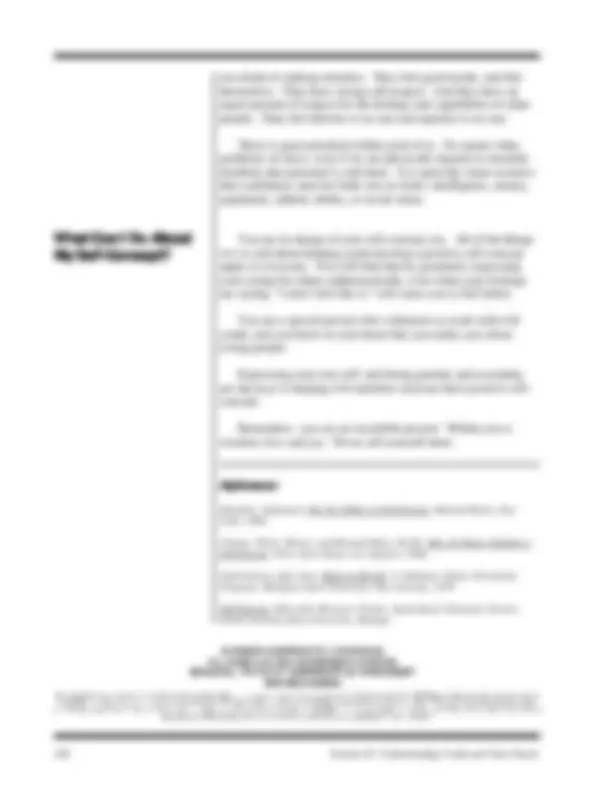




Study with the several resources on Docsity

Earn points by helping other students or get them with a premium plan


Prepare for your exams
Study with the several resources on Docsity

Earn points to download
Earn points by helping other students or get them with a premium plan
Community
Ask the community for help and clear up your study doubts
Discover the best universities in your country according to Docsity users
Free resources
Download our free guides on studying techniques, anxiety management strategies, and thesis advice from Docsity tutors
4-h leaders with practical tips on developing a positive self-concept in 4-h members. It emphasizes the importance of genuine appreciation, expressing acceptance, non-judgmental attitude, listening, caring, fairness, and creating a trusting environment. The document also discusses the origins of self-concept and how it can be changed.
What you will learn
Typology: Exercises
1 / 4

This page cannot be seen from the preview
Don't miss anything!



N EW J ERSEY A GRICULTURAL E XPERIMENT S TATION
One of the major life-skills that are developed through the 4-H Program is “Developing A Positive Self-Concept.”
As a 4-H Volunteer, you have many opportunities to make a positive impact on each 4-H member’s self concept. Every important adult in a child’s life influences his/her belief in his/her own value to others and to him/herself. This includes parents, teachers, 4-H leaders, grandparents, older brothers and sisters, youth leaders and religious leaders.
What is a positive self-concept? It is a growing belief about yourself that helps you to cope successfully with the events in your life, and then to make a positive impact on the lives of others.
As a 4-H youth leader, your attitude of non-judgmental, acceptance toward each child is essential. This helps each mem- ber feel accepted as the person he/she is, rather than for behavior, clothes or skills. One way to do this is to show genuine apprecia- tion for each individual. If you aren’t genuine, a child will know it right away.
FeedbackFeedbackFeedbackFeedbackFeedback —Genuine appreciation is also positive feedback. Although we would like to be able to only give positive feedback, part of being an adult role model for youth includes making corrections. You are probably asking, “How can I make correc- tions constructively?”
Since each child is unique and already has a self-concept in the process of development, you cannot guarantee how a child will accept correction. Experts recommend that all feedback include at least 75 percent positive comments as you make a correction to keep things in balance. A division of 50/50 positive comments to criticism doesn’t work. Your 4-H members may feel unworthy unless you use the 75/25 balance.
Written by: Rose Mary Bergmann, County 4-H Agent, Morris County and Sylvia Ridlin, Extension Spe- cialist in Human Development, 1990, Revised 2000
For example, “You have done an excellent job on this record book. Your handwriting is neat, you have reported all of your expenses, and your story follows the guidelines. However, you did not include the number of 4-H meetings you attended. Next year, you might want to keep a tally on your 4-H calendar so you can fill in this part of your record book easily.”
Expressing AcceptanceExpressing AcceptanceExpressing AcceptanceExpressing AcceptanceExpressing Acceptance —You can help express acceptance by seeing beyond a behavior to the true self within each 4-H’er. One technique that may help youth discover their uniqueness is to distribute 3x5 cards, at the end of each meeting, and ask them to list the things they liked about themselves during the meeting.
You could also invite your members to list what they learned and encourage them to discover things that were not part of the “les- son plan.” There should be no right answers to match, but all things learned should be encouraged so each person can discover the variety of learnings that take place in a group.
Nonjudgmental AttitudeNonjudgmental AttitudeNonjudgmental AttitudeNonjudgmental AttitudeNonjudgmental Attitude —Your attitude to each 4-H mem- ber will be obvious to the children. Even though adults have learned how to say one thing and do another, children often see through this immediately. So it is important to be honest within yourself as you notice your relationship with each youth. Having and expressing a non-judgmental attitude is an important part of helping youth develop a positive self-concept.
Within the group setting you can help the members remove their judgments from situations by demonstrating neutral behav- ior. When a person in the group shares an experience, feeling, or a thought, the leader accepts it as the true expression of that person at that moment. For example, if a youngster says he could not bring his record book because his parents wouldn’t let him, the leader and members don’t attack him with, “You’re lying. That’s not true. You just forgot it.” Instead, the leader sets a positive example by saying, “Okay. Let’s work together with your parents so you can bring it to the next meeting.”
ListeningListeningListeningListeningListening - By listening to a child and treating them with respect, you are in turn facilitating self-respect. Not only should you give all children a chance to speak, you should listen to them attentively and acknowledge what they are saying. You should speak to children as you would speak to an adult and listen to them as you would an adult.
not afraid of making mistakes. They feel good inside, and like themselves. They have strong self-respect. And they have an equal amount of respect for the feelings and capabilities of other people. They feel inferior to no one and superior to no one.
There is great potential within each of us. No matter what problems we have, even if we are physically injured or mentally disabled, that potential is still there. It is upon this inner resource that confidence must be built; not on looks, intelligence, money, popularity, athletic ability, or social status.
You are in charge of your self-concept, too. All of the things we’ve said about helping youth develop a positive self-concept apply to everyone. You will find that by genuinely expressing your caring for others enthusiastically, even when your feelings are saying. “I don’t feel like it,” will cause you to feel better.
You are a special person who volunteers to work with 4-H youth, and you know in your heart that you really care about young people.
Expressing your true self, and being genuine and accepting are the keys to helping 4-H members increase their positive self- concept.
Remember: you are an incredible person! Within you is wisdom, love and joy. Never sell yourself short.
References:References:References:References:References:
Brandon, Nathaniel; The Six Pillars of Self-Esteem. Bantam Books, New York, 1994.
Clemes, Ph.D., Harris, and Reynold Bean, Ed.M.; How To Raise Children’s Self-Esteem, Price Stern Sloan, Los Angeles, 1990.
Goth-Owens, Judy Ann; High on Myself,, A Substance Abuse Prevention Program, Michigan State University, East Lansing, 1979.
Self-Esteem, Education Resource Packet, Agricultural Extension Service, North Carolina State University, Raleigh.